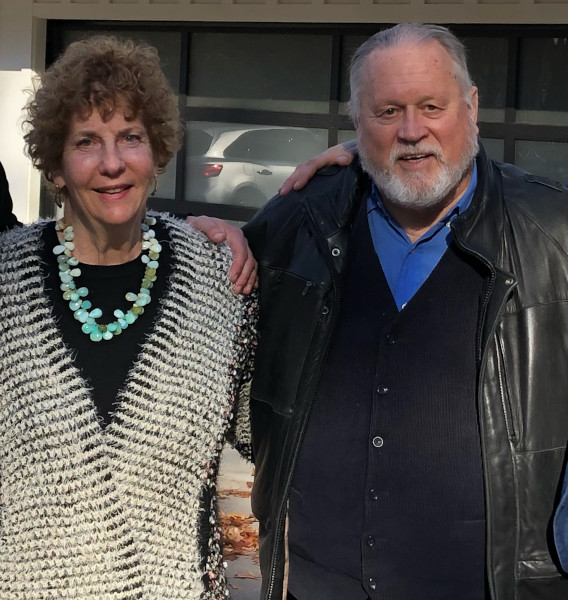Behrmanns add to legacy with creation of undergraduate scholarship for special education program
March 14, 2024
By Jerome Boettcher
Year in and year out, George Mason’s special education graduate program ranks as one of the best in the nation.
In the latest U.S. News & World Report rankings of online master’s degree programs, Mason’s special education program ranked eighth in the country. In 2023, the special education graduate program ranked 17th in the country among public institutions and 19th overall.
Pamela Baker, the Special Education Division Director, points to one man for laying the foundation for a program that consistently produces quality teachers – Michael Behrmann.
“He is kind of a legend here,” Baker said. “He built the special education program.”
Seven years after retiring from a nearly 40-year career in the special education program that included serving as division director prior to Baker's tenure in that role, Behrmann continues to add to his legacy.

Behrmann, along with his wife, June, has generously created an undergraduate scholarship for Mason students in the special education program. The undergraduate special education program, which was created in 2019 along with bachelor’s degrees in elementary education and early childhood education for diverse learners, aims to tighten the nationwide teacher shortage gap.
Students who plan to teach may focus their program on a specific area in the special education field by adding a licensure concentration – K-12 adaptive curriculum, K-12 general curriculum licensure or PK-12 blindness and visual impairments licensure – or pursue a non-licensure concentration.
“We need more teachers working with that population of students,” Behrmann said. “Children with special needs are our most vulnerable students. It’s a huge problem. Undergraduate programs are one way that can be really addressed and start to bite into that shortage of qualified teachers.”
Behrmann arrived at Mason in 1979 as the coordinator of the special education graduate program, which had just three faculty members and a small handful of graduate students.
Over the next four decades, the program grew as Behrmann secured more than $90 million in external grants and contracts, $30 million in revenue-based projects and $4.5 million in gifts for special education to the university. He also designed and implemented a master’s degree program in Assistive/Special Education Technology in 1986, followed by a doctoral program in Assistive/Special Education Technology.
The special education program now enrolls more than 1,000 students annually and employs more than 150, which includes faculty, staff, graduate assistants and student workers.
“My legacy I consider to be the faculty that are at George Mason now,” Behrmann said. “Master’s and doctoral students who are now faculty. They are such great researchers and trainers. Pam and that whole crew of special educators are just tremendous.”
Behrmann also started the Mason LIFE program, a four-year post-secondary comprehensive transition program for young adults with intellectual and developmental disabilities who desire a university experience in a supportive academic environment.
Behrmann said the primary focus of the scholarship will be to support special education undergraduate students who are working with the Mason LIFE program.
“It is a program that affirms our mission,” Baker said. “We are here to make a positive impact on the lives of people who have disabilities. These young adults are integrated into the fabric of the university. They come back as alumni. Our Mason LIFE students have been in the Green Machine band. They have been cheerleaders. They are all over the campus. That is not the way it was 20 years ago. Mike had the vision.”
When he founded the Mason LIFE program in 2005, Behrmann’s vision was twofold. He wanted to provide an educational, on-campus experience for students with disabilities. But he also wanted to offer Mason graduate and doctoral students (and now undergraduate students) working in the Mason LIFE program an opportunity to attain hands-on special education experience while also pursuing their degree – or degrees.
The Mason LIFE program, which is currently led by director Linn Jorgenson, enrolls around 50 students every year, with 18 freshmen admitted for the 2024-25 school year.
“At the time, it was one of only one or two programs in the whole United States,” Behrmann said. “They have spun off, with federal support, and are much more common across the country. Seeing that program continue to be supported, within the diversity of the university, really makes me proud. All the university presidents from Alan Merten to current president Gregory Washington, have been great supporters of the Mason LIFE program.”
Michael and June Behrmann have made a lifelong commitment to special education. The couple met when they were both teaching in Cincinnati. June then spent more than 20 years as a writer specializing in special education issues before returning to the classroom as a special education teacher for Fairfax County Public Schools.
Now they want to help ensure that Mason’s undergraduate program shapes the next generation of special education teachers.
“If we can give this [undergraduate] program the kind of marketing it needs, support more students, it has real potential to grow into a large scholarship program,” Behrmann said. “The special education program is one of the strongest programs in the university and I’m excited to see it continue to grow.”
The Behrmanns encourage graduates of the special education programs and certificate programs to get involved personally and give back to the scholarship fund. To make a gift, click here.
